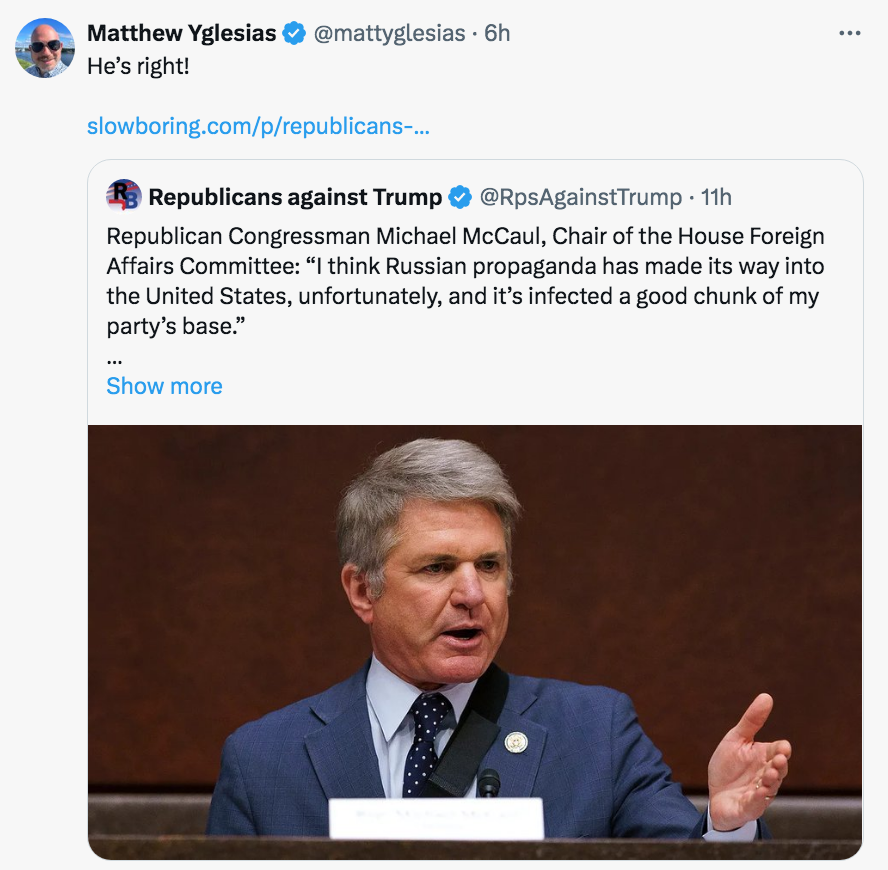1. Be careful what you wish for (from Matt Yglesias’s Substack):
While several states have banned abortion, a bunch of other states have made it easier to get medication abortions and otherwise reduced restrictions with the result that there were actually more abortions in 2023 than in previous years. And abortion rights is getting more popular. A new Fox poll showed that 70 percent of the public believes mifepristone should be legal and the previously popular idea of a 15-week ban is now underwater 43-54. Abortion rights have become a millstone around the GOP’s neck, and the more people argue about this, the more they seem to be moving in favor of abortion.
As a matter of law, I agree with the Supreme Court. But as a matter of policy, I’m pro-choice.
2. I’m so glad to live in a state where pot is legal, abortion is legal, physician assisted suicide is legal, you can buy Teslas directly from the manufacturer, and lab produced meat is legal:
Lawmakers in US state capitals are seeking to stifle development of “lab-grown” tuna, pork and other animal proteins, taking a stand against a novel food technology backed by investors such as Bill Gates and Jeff Bezos.
Republicans in at least seven states have introduced legislation since the beginning of the year to ban sales or distribution of lab-grown meat, a form of edible protein cultivated from animal cells. . . .
Florida’s legislature in March sent legislation banning sales of lab-grown meat in the state to DeSantis, who in February said: “We are not going to do fake meat. That does not work.” A spokeswoman for the governor declined to comment on whether he will sign the bill.
The GOP fervently believes that every American should be free to pursue GOP-approved lifestyles.
3. Market participants seem surprised by the Tesla sales slump:
A myriad of red flags went up throughout the quarter. First, Tesla warned its rate of growth will be “notably lower” this year, blaming interest-rate hikes that have kept its cars out of reach for many consumers even as it’s slashed prices. The company dealt with multiple disruptions at its plant outside Berlin. Musk engaged in inflammatory posting on X, turning off prospective buyers, and China’s EV market grew even more cut-throat.
I don’t have a Harvard MBA, but when most of your customers are Democrats, does it make sense for the CEO to spend all his spare time insulting liberals on Twitter, er, . . . I mean X?
Maybe he thought it would convince Republicans to buy EVs. Did Trump convince Republicans to take the vaccine?
BTW, I think Tesla is a great company. But that new pickup truck? Yikes.
4. What do you mean, “fool’s gold“?
But that can be worthwhile. Some 5-10% of the world’s gold production derives from pyrite. And this is likely to increase. According to estimates by McKinsey, a consultancy, 24% of the world’s gold reserves are “refractory”—meaning the gold must be yanked from the clutches of some mineral, in most cases pyrite.
5. I’ve been dismayed to see the GOP become an increasingly pro-Putin party. Previously, I attributed this to Trump. But a GOP Congressman suggests that extensive Russian propaganda also plays a role. (If I didn’t block lots of Russia trolls, this blog’s comment section would be almost entirely dominated by pro-Putin posters.)

6. I thought that Russia’s invasion of Ukraine might cause a few anti-China people to rethink their views on the “real enemy”. Unfortunately, it did not. And according to The Economist, things are even worse than I imagined:
To get involved directly, says Mr Biden, would be “World War III”. He has refused calls to impose a no-fly zone over Ukraine, act as the intermediary for Polish MIG-29 jets or even supply American-made Patriot anti-aircraft batteries. . . .
Mr Biden’s caution in Ukraine contrasts with his almost careless talk about defending Taiwan against China. Last year Mr Biden said America had a “commitment” to defend the island. America’s “strategic ambiguity”, whereby it promises to help Taiwan defend itself but will not say whether it would intervene directly, has become less ambiguous.
So we should not risk WWIII with nuclear armed Russia, but we should risk WWIII with nuclear armed China? I agree with Biden on Ukraine, but his China policy is madness. Yes, I know. Gotta defend those semiconductor factories. As George C. Scott once said, “I’m not saying we won’t get our hair mussed”.
7. Making fun of the intelligence of conservatives is like shooting ducks in a barrel. (Ditto for leftists.) But the following tweet also makes me wonder why so many conservatives wish our educational system went back to teaching the classics. Say what you will about extremists like the Taliban, at least they understand that the arts are a force for liberalization.

Hey conservative parent. Do you really want your children to read what Jesus said about how you should treat the poor refugee that shows up at your door?
(Of course Romeo and Juliet should be mixed race. My only complaint is that the two actors don’t look like children.)
8. China has been demonized for supposedly building lots of “overcapacity.” This led the US to impose high trade barriers. But as David Fickling at Bloomberg recently pointed out, the accusations are not true:
The trouble is, none of it was true. China wasn’t seeking to produce more steel than long-run demand would dictate. It wasn’t even a particularly important exporter. It wasn’t responsible for weak prices in the US. The tariffs didn’t halt a jobs decline in US metals manufacturing.
It’s bad enough that misguided steel protectionism over the past decade has served only to raise costs and reduce competitiveness for the rest of the US economy. Worse still is the way the same failed policy is now being dragged out to support far more damaging barriers on clean technology, slowing our ability to halt the rise in global temperatures.
9. The Biden administration is pursuing an “industrial policy” aimed at boosting manufacturing. Australia tried a similar policy back in the 1960s, and it failed. Here’s The Economist:
The [Australian auto] industry survived so long only because successive governments refuelled it with subsidies. GM guzzled about A$2bn ($1.3bn) before the handouts were cut by Mr Morrison’s party in 2013. Rightly so, according to a report released the following year by the Productivity Commission. It found no evidence that they had helped the wider economy, concluding that the “costs of such assistance outweigh the benefits”.
Manufacturing’s share of Australia’s economy peaked in the 1960s, in Holden’s heyday. It now accounts for just under 6% of GDP, well below the level of most other rich countries. But that has not stopped the Australian economy—and local wages—from growing faster than their peers.